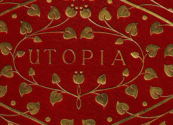Rabbit Holes and Shiny Objects
by Kate Eickmeyer
I haven’t decided which text to write about, but here are some concepts I’ve been thinking about:
I’m interested in the aesthetic environments (or lack thereof) in utopian texts and the implications of those aesthetics for subjectivity. Acknowledging some significant exceptions, I’m thinking about the parallels between early utopian asceticism and the current affinity for minimalistic, white- and beige-washed environments and fears of contamination from color and embellishment, or “chromophobia,” as David Batchelor puts it. I wonder if there is also something to do with the early utopian treatment of whimsy; the word “whimsy” is derived from 16th century words “whim-wham” and “flim-flam” (Houyhnhnms, anyone?); perhaps this was an appropriate moment for such terms for the extraneous and fanciful to come into being. Were lines drawn between feudalistic avarice and apolitical, innocent novelty? Or, was “whimsy” an entirely dangerous phenomenon in the context of a society where punishment was capricious and capital? Or something else entirely?
Obviously Gulliver’s Travels is chock-full of whimsy, but I’m more interested in how our expectations of exotic physical environments in the earlier texts Swift parodies are disappointed. And, while The Blazing World is so encrusted with jewels it makes the Magic Kingdom look like Bauhaus, jewels are children’s trinkets in More’s Utopia and mere rocks in the road in Candide. More and Voltaire are suggesting, of course, that the aesthetic appreciation for color and sparkle in our non-utopian world is driven entirely by the economic value of gold and jewels, with their value owing to scarcity alone. But also colorful, feature-rich physical environments are not part of the rational project, so how do these texts posit non-utilitarian environmental features as contaminants?
This idea is also tangled up with denial of subjectivity, and more recent dystopian works tend to either represent grey, colorless worlds of surveillance and oppression, or overly-embellished societies that conceal evil beneath shallow surfaces. Anxieties about frivolity, and how much of it to allow in the ideal environment, continue to prevail, along with cycles of indulgence and restraint. What is the difference between approved and unapproved types of whimsy? The Fohrmann piece, “From Literary Utopia to The Utopia of Subjectivity,” addresses the issue of subjectivity; he writes: “Utopia’s remedy is now quite simple: a new society should be created in a separated space, in which man’s inner nature is disciplined by a reason that organizes society as a perpetual recurrence of never-changing rituals” (290). Caprice and idiosyncrasy don’t fit, so their disorderly environmental manifestations don’t either.
On a separate note, is there more to make of modes of access to utopias: the portals or trials one must go through to get in or out of them, not just as a metaphor for imperialism and isolationism, but as a landscape beyond natural laws and the limits of reason? Getting to a utopia often requires travel through not only a physical portal, but also through a portal of experience caused by nature or the unknown. The shipwreck is the most common avenue in the texts we’ve read, and it entails not only the unreproducible nature of the event but also a narrative of death and resurrection in the new environment (why the resurrection component?). Animals can also be the catalyzing forces; the coneys in Rasselas show the prince the way out of the happy valley, and the bears in The Blazing World carry the empress into their society. While the requirement of accident precludes the possibility of anyone in the real world verifying the utopia and reinforces the idea of the utopia as elsewhere or nowhere, the invocation of such experiential portals renders the utopias simultaneously more exotic and more personal, or more accurately, promise such outcomes, even if they never come to fruition. The mode of access is irrational and unintended, yet the destination is the product of rationality and intention. Is there anything to do with all this?
I’m also interested in utopia and Enlightenment philosophy as “poor man’s Buddhism” per our discussion of Rasselas, as well as utopian visions of the ocean and oceanic cultures. I’m also interested in writing the paper on Cavendish and the Kabbalah.
As a somewhat tangential aside, I’ve been researching the history of immersive/themed/place-based entertainment, starting with Dyrehavsbakken, a Danish amusement park that opened in 1583 (a mere 67 years after More’s Utopia was published!). Most of what I’ve found on this subject is all about hyperreality and debunking Disney, and I think there’s more to do from the utopian perspective. I haven’t really worked out any connections to our texts so it doesn’t really pertain to this paper, but I thought I’d throw it out there in case anyone happens to be brimming with ideas or has friends in high places who might be interested in the project.


